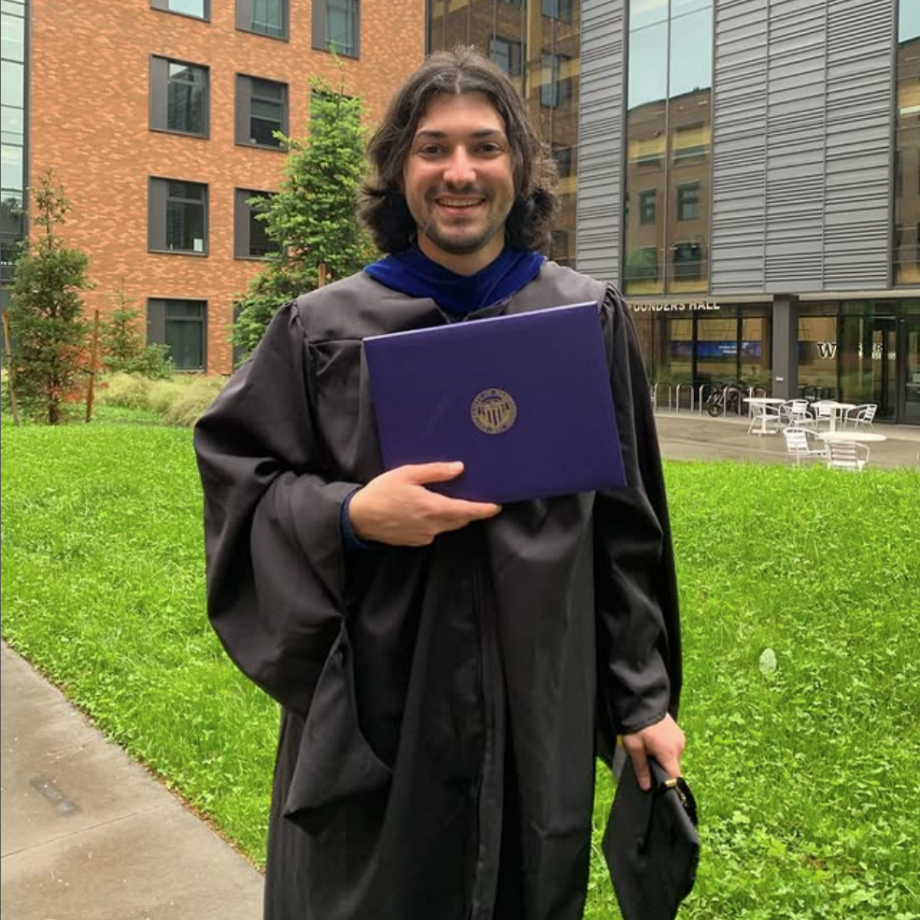The Utility of a Master of Taxation Degree
Kain Coronado uses his Master of Science in Taxation to help regulate the cost of utilities in Wisconsin
Every time a resident of Wisconsin turns on the lights, they are protected by Kain Coronado (MS 2023).
Coronado plays a pivotal role in regulating the rates that Wisconsin residents pay for household electric and natural gas. His work has a vital yet unseen impact on the cost of living for the 6 million people who call Wisconsin home.
Coronado’s career exemplifies the wide range of roles available to graduates of the Master of Science in Taxation program at the Foster School of Business.
As a Public Utility Auditor, Coronado evaluates requests from utilities to raise prices. When a utility proposes a rate increase, Coronado leads the team that reviews the company’s projected financials. He analyzes forecasted sales revenues and income tax obligations, then compiles his findings into a high-level summary for the state’s utility Commissioners. These summaries help inform the Commission’s decisions to approve, modify, or deny proposed rate increases for electricity and natural gas.
“When a utility wants to raise rates, they bring us their financial forecasts, sometimes looking years ahead,” Coronado explains. “I lead our team in reviewing those numbers, especially projected sales revenues and income taxes. We’re making sure their request is reasonable and that it holds up under scrutiny. It’s about getting to the truth in the data before any decisions are made.”

Applying tax skills in a broader context
Coronado says his Foster School of Business coursework provided experiential learning experiences that prepared him to thrive in public utilities and taxation.
“One of the most valuable things I took from the program was the confidence to present information clearly and assertively,” says Coronado. “At Foster, we did mock presentations where we practiced sharing our knowledge with partners or clients. I use that same skill when presenting to Commissioners or explaining audit adjustments to utilities. It’s a critical part of my role.”
Hard facts and soft skills
Coronado’s challenging role necessitates a blend of hard analytics skills and the ability to communicate complex data effectively. Coronado credits the Foster Master of Taxation program with helping him develop both the hard skills he uses in his analytics work and the professional skills required to craft effective presentations.
“Foster taught me technical and soft skills,” Coronado explains. “Even though I’m not in a traditional tax or accounting firm role, I still rely on those technical foundations when reviewing things like income tax forecasts. And the practice I got on the communication side helps me present clearly and confidently.”
Choosing Foster to expand his skill set
Coronado studied accounting at the University of Wisconsin-Milwaukee as an undergrad in his home state. Shortly after graduating with a bachelor’s degree, he began his career as a public utility auditor. After a few years in the position, he wanted to explore new opportunities and sought a well-respected graduate program to develop his skills further. He chose the Foster School of Business.
“I knew I wanted to go to grad school and have it be a meaningful experience,” Coronado recalls. “I started looking into programs with strong reputations in accounting. Foster really stood out, not just for its track record, but also for how welcoming it seemed to out-of-state students. Seattle and Foster offered a different perspective, a more diverse environment, and a chance to grow personally and professionally.”
Once on campus, Coronado says he was immediately made to feel welcome. He bonded with fellow classmates over a love of sports. In the blink of an eye, he became a serious Husky fan, attending nearly every University of Washington home football game and following several other Husky sports.
While there was time for fun, most of his days were spent in class or studying. Coronado says the program wasn’t easy, but it was certainly worthwhile.
Serving communities across Wisconsin
Now back in Wisconsin, Coronado is thriving in a role that enables him to use his Foster education to serve everyone who calls Wisconsin home. His work directly impacts his neighbors’ pocketbooks, and he takes the role seriously.
“It might look like just spreadsheets and forecasts, but at the end of the day, what we do directly affects how much people pay for essential services,” Coronado says. “There’s a real responsibility in that. Having the right skills and perspective from Foster helps me approach the work with the care it deserves.”

A Master of Science in Taxation that pays dividends
Coronado cites the many guest experts who presented in his classes as particularly impactful. They provided insights from working professionals, sometimes touching on unexpected topics and new areas of taxation.
“We had a speaker forum class where professionals from a wide range of backgrounds came in to share their perspectives,” Coronado recalls. “Some of the topics weren’t ones you’d expect. For example, one guest talked about cryptocurrency and blockchain, and how tax policy intersects with those areas. It broadened our understanding of how tax impacts emerging industries.”
“The Master of Taxation was definitely an intensive program, with lots of research and reading, and digging into the Internal Revenue Code,” Coronado concludes. “It was challenging, but it gave me a strong foundation and helped me understand the ‘why’ behind the work we do.”
With a master’s degree in taxation and a strong sense of civic duty, Coronado proves that technical expertise can drive meaningful public impact. In a role few people see, he’s making a difference every time the lights come on.
Learn more about the Master of Science in Taxation program here.

